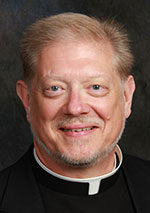That All May Be One / Fr. Rick Ginther
Ecumenical partners are called to speak that others might hear
 Assimilation: the art of drawing diversity into a unity, while maintaining unique qualities of the various elements drawn into oneness.
Assimilation: the art of drawing diversity into a unity, while maintaining unique qualities of the various elements drawn into oneness.
I was fortunate to once again participate in the National Workshop on Christian Unity 2018 in Silver Springs, Md., on April 16-19. I came away with a diversity of ideas, insights and questions. I am still trying to assimilate them into an ecumenical whole.
Thematically, the workshop’s foundation was “God’s Power Nurturing Communities of Witness and Dialogue.”
“God’s Power”: that is, the power of truth spoken to untruth through the Holy Spirit.
“Nurturing Communities”: that is, newly linked Christian church voices once locked in debates of “differences” now linked in common purpose.
“Of Witness”: that is, to advocate, educate, elucidate (make clear) that all people are created equal and deserve equal justice. That neither race, national origin, immigration status, nor any other discernable difference matters more than being created in the image and likeness of God.
“And Dialogue”: that is, showing our fractured world that ecumenical dialogue is a viable model for healing not only historical differences among Christians, but healing historical differences of any kind.
We were lead through these thematic “moments” in sessions by a variety of speakers. One led a daily Scripture study, and her opening text was the Book of Genesis, Chapters 1 and 2, the creation stories.
The greatest insight for me was in Gn 1:31, “… and God saw that it was very good.” The Hebrew “very good” means “a connection, overflowing and abundant.”
All of creation is “very good”—connected. Separation is not creation’s essence or purpose.
And human beings are made in God’s image (Gn 1:26). We belong to God because we bear the icon of God. We are to be ambassadors, witnesses of God.
And our “dominion” over the whole of creation is to maintain the wellness of all things (Genesis 2). Humans are to “till and keep”; put another way, to “serve and protect” all created things.
Our Judeo-Christian world view, therefore, does not allow for any form of relationship which uses another to build up the user. No form of slavery, racism, oppression, apartheid, economic subservience, exploitation of the environment, etc., is to be tolerated by or practiced by a Christian.
And no theology or religion which claims itself “Christian” can refuse self-examination of its history, present practices or teachings which may be grounded in such domination.
We have to face, we were told, that the Church has been complicit at times with unjust systems. We have suffered a peculiar dichotomy of “silence”: many words about “justice,” yet “inaction” to right the injustice.
Christian churches are to be partners in holding one another accountable, and in bringing that accountability to the larger community. We may be involved with other religions as partners, too. Our local reality and God’s Spirit will provide the partnerships we can nurture.
There is much more to assimilate from the recent National Workshop on Christian Unity. I shall continue to pore over the thoughts and ideas, and hopefully grow into a better ecumenical “wholeness.”
In the meantime, I shall hold fast to this: ecumenical partners are called to speak that others might hear, and listen that others might speak. In this way, the truth shall be found, and lived as one.
(Father Rick Ginther is director of the archdiocesan Office of Ecumenism. He is also pastor of Our Lady of Lourdes Parish in Indianapolis.) †
 Assimilation: the art of drawing diversity into a unity, while maintaining unique qualities of the various elements drawn into oneness.
Assimilation: the art of drawing diversity into a unity, while maintaining unique qualities of the various elements drawn into oneness.